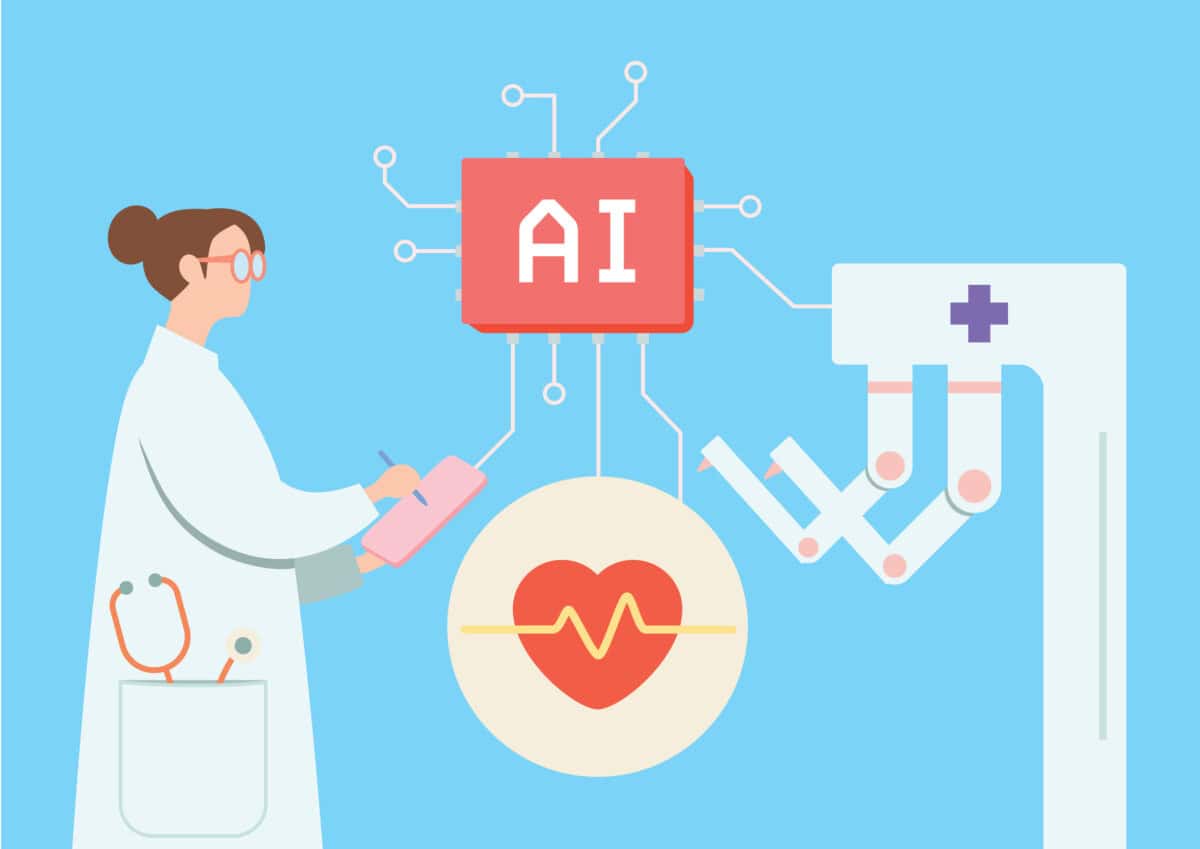Faced with many challenges, including the aging population, rising treatment costs, and increasing demand for personalised care, the modern healthcare industry is currently going through a significant transformation where innovation across the field is no longer a matter of choice but a necessity.
Business analysis in healthcare are called upon to help healthcare organisations navigate these complex processes by analysing data, identifying key trends, and optimising operations.
A big part of this transformation process is data-driven, fuelled by the rapid development of AI (artificial intelligence) and ML (machine learning). Similar to many other industries currently experiencing tectonic shifts, one of the pivotal roles in driving innovation in the healthcare sector belongs to business analysis.
As artificial intelligence technology continues to develop at unprecedented speed, BA practitioners now have access to powerful AI tools for analysts that can improve decision-making, streamline processes within healthcare industries, and, most importantly, improve patient outcomes.
Below, we will take a closer look at the transformative role of AI in business analysis in healthcare and explore how it impacts the role of business analysts.
Table of Contents
The Role of Business Analysis in Healthcare
The main responsibilities of business analysts involved in projects within the healthcare sector include gathering, interpreting, and presenting data to help organisations make informed decisions.
They typically cover the areas of operational efficiency, cost reduction, patient satisfaction, and regulatory compliance all to enable healthcare organisations to function more efficiently and provide optimal care for their patients.
So, by collecting, analysing, and documenting data from electronic health records (EHRs), clinical studies, patient surveys, and various other sources, business analysts play a role in improving healthcare delivery and enhancing patient outcomes.
However, performing these tasks is usually quite challenging for business analysts, as the amount of data generated in hospitals and other healthcare organisations is massive and, more often than not, unstructured.
This creates significant obstacles when it comes to data processing, at least when done by using traditional methods. And, this is where AI comes into play, providing tools and methods that BA practitioners can use to process huge data sets, extract insights more efficiently, and focus on higher-level strategic tasks.
There is no doubt that this technological synergy and fusion of AI innovation and proven analytic methods hold great potential for the future of business analysis in healthcare.
How AI Transforms Business Analysis in Healthcare
While AI technology is quickly transforming the entire field of business analysis, its implementation is particularly important in certain industries, including healthcare, where providing conditions for more accessible and efficient decision-making not only enhances an organisation’s operational ability and drives its growth, but can often literally mean the difference between life and death.
To illustrate the importance of these innovations, here are some of the key ways Artificial Intelligence can support business analysis in healthcare:
Predictive Analytics for Informed Decision-Making
In business analysis, predictive analysis is used to forecast future events by using historical data. This is, naturally, invaluable in healthcare, probably more than in any other industry, as it provides grounds for anticipating disease outbreaks, patient admissions, and resource needs.
By using AI-powered predictive models, business analysts can generate actionable insights, helping healthcare providers to proactively address patient needs, allocate resources, and reduce costs, improving the overall quality of their services and making the entire process more efficient.
Enhanced Diagnostics and Treatment Personalisation
AI tools for business analysts, including machine learning algorithms, can improve the diagnostic processes by accurately analysing medical images and lab results.
When working with this level of precision, BAs can gain better insight into treatment effectiveness, which further enables the creation of personalised care plans.
For example, algorithms can evaluate patient medical history to suggest tailored treatment options, a key to improving outcomes and reducing potential side effects.

Streamlined Administrative Processes
Healthcare workers are often swamped with menial administrative tasks which can take a lot of their time and diminish their ability to perform their primary role – taking care of patients.
The AI tools can be of great help here, as AI-driven automation can take on and manage routine tasks like claims processing, appointment scheduling, and billing.
Automation of these tasks will not only improve the efficiency of healthcare organisations but also reduce costs, which can be very important, especially for healthcare establishments that operate on a non-profit basis.
For BAs working on healthcare projects, this also means that they can shift their focus from routine tasks to higher-level strategy and process optimisation.
Data Integration and Management
Another way AI can help BAs be more efficient when working in the healthcare industry is by facilitating the integration of data from disparate sources.
This allows business analysts to work with a consolidated dataset that provides a holistic view of patient details. and any other information related to healthcare operational processes.
As a result, healthcare organisations make faster, data-driven decisions and sustain interoperability across systems, a critical need in healthcare where data is spread across various platforms and among different sectors within the organisation.
Advanced Natural Language Processing (NLP)
NLP
This technology can be used to analyse unstructured data like clinical notes and medical literature, extracting meaningful insights, which helps business analysts mine valuable information from patient feedback, physician notes, or research papers. All of this is invaluable when it comes to enhancing decision-making and improving patient care.
AI Tools for Business Analysis in Healthcare
When working in the healthcare sector, business analysts will have several AI tools
- Machine learning algorithms: This type of AI tool allows BA practitioners to create predictive models, which, as we mentioned above can enable insights into patient trends, treatment outcomes, and resource optimisation.
- Natural language processing (NLP): Some of the most popular NLP tools, such as IBM Watson and Google Cloud NLP, can be used to help BAs analyse unstructured text data. This significantly simplifies the extraction of insights from medical records and research articles.
- Data visualisation software : BAs often use several well-known and widely used platforms, including Tableau, Power BI, and Qlik Sense, to support data interpretation through visually engaging charts and dashboards. By doing so, they make complex insights more accessible and easier to understand for decision-makers and any other stakeholders that may find it useful.
- Robotic process automation(RPA) : A great way to streamline repetitive tasks, save time, and be more efficient is to use tools UiPath and Automation Anywhere. These tools allow business analysts to automate some of the routine processes like data entry and report generation.
All these tools should be a part of every healthcare BA’s toolkit, as they empower them to handle large datasets, extract insights more efficiently, and focus on high-impact tasks that improve organisational outcomes.
Challenges of Implementing AI in Healthcare for Business Analysts
We already covered numerous benefits that AI can deliver for BAs working in the healthcare industry. However, the implementation of this revolutionary technology is not without its challenges:
Data Privacy and Security
One of the primary concerns in the healthcare industry, not only when it comes to the business analysis roles, is data privacy and security.
Healthcare data is highly sensitive, and maintaining patient confidentiality is paramount. So, there are reasonable fears that the implementation of automated AI models and tools may jeopardise this sensitive data.
There’s no denying that balancing the need for data accessibility with stringent privacy requirements can be challenging. Therefore, BAs must ensure that AI tools adhere to strict data privacy and security standards, including encryption and access controls, to protect patient information.
Data Quality and Integration Issues
Healthcare data typically comes from multiple sources and is often presented in different formats. So, there’s always the risk that inconsistent or incomplete data can lead to inaccurate analysis and flawed insights, which in the healthcare industry can have disastrous consequences.
One of the main responsibilities of healthcare business analysts is to ensure data quality and achieve seamless integration across systems. This requires robust data management practices, which can be complex and resource-intensive.
Resistance to Technological Change
One of the issues that often appears across industries is the resistance towards change. This is especially visible in the healthcare industry, where some professionals may be hesitant to adopt AI-driven approaches, preferring to rely on their own clinical experience and judgment.
BAs must put in an effort to foster a data-driven culture within healthcare organisations, emphasising and clearly explaining the benefits of AI and addressing concerns through training and open communication.
Algorithm Bias and Ethical Concerns
AI algorithms are susceptible to bias which can be a serious issue in an industry such as healthcare because it can impact decision-making in sensitive matters, including treatment recommendations and patient risk assessments.
Business analysts should collaborate with data scientists to monitor and mitigate biases in AI models as that is the best way to ensure fair, equitable, and ethical outcomes.
Cost and Resource Constraints
Obviously, the implementation of any new technology, including AI solutions, frequently requires significant investment in infrastructure, software, and skilled personnel.
This can often be a burden for smaller healthcare organisations that may struggle to allocate the necessary resources, creating disparities in the benefits AI can offer. Before recommending AI solutions, BAs must consider budget limitations and evaluate the cost-benefit ratio.

